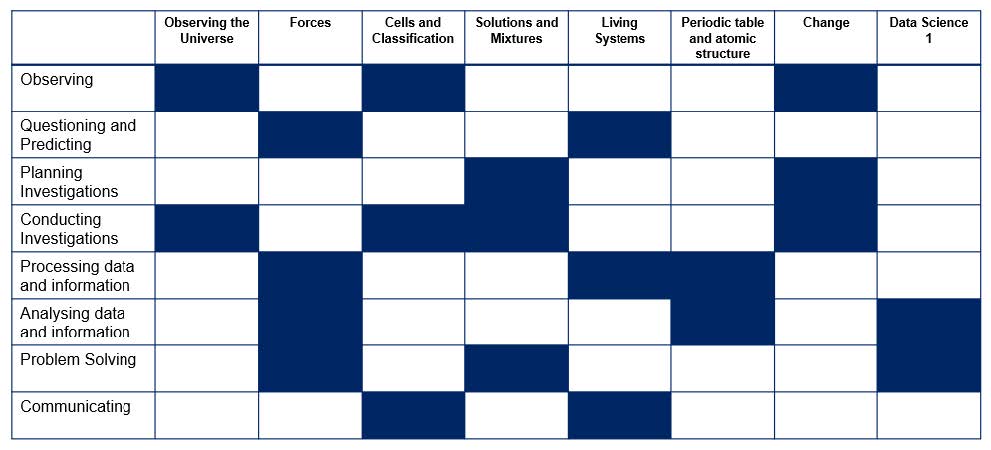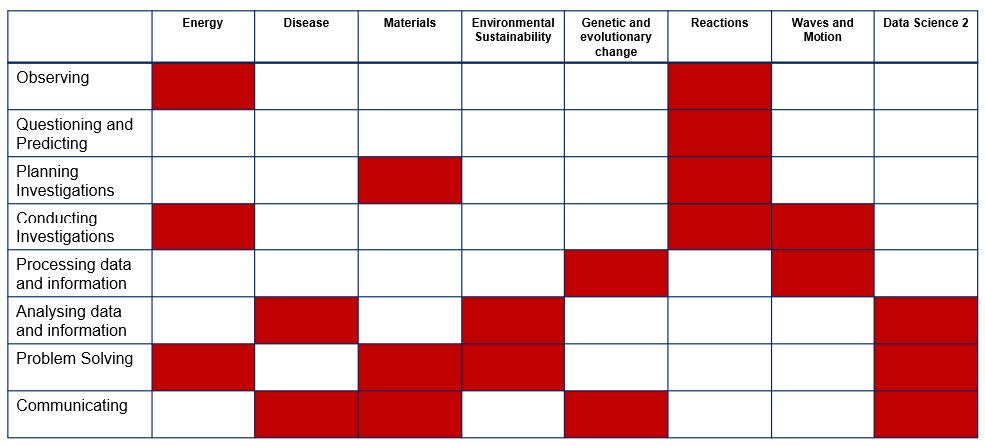Spotlight on the new 7-10 Science Syllabus
The new NSW 7-10 Science Syllabus has been released, and in response, STANSW has established a Syllabus Working Group dedicated to smoothing the transition for NSW teachers. The purpose of the Syllabus Working Group is to lead the development and dissemination of resources, training materials, and support mechanisms for teachers adapting to the new NSW 7-10 Science Syllabus. This group will serve as a central hub for expertise, collaboration, and guidance, ensuring a smooth and effective implementation process across NSW schools.
Below are some key questions that arose from our recent working group meetings, and answers that have been provided by NESA.
Key Questions and Answers from our consultation with NESA
Q: Implementation timeframes
STANSW raised concerns with NESA that there was inconsistent and unclear messaging regarding the implementation timeline of the NSW syllabus. The new syllabus is significantly different from the current syllabus with new content and the introduction of complex concepts earlier in each stage. Introducing the new syllabus entirely in 2026 will lead to disrupted concept development creating difficulties for both students and teachers.
A: NESA's most recent advice regarding the implementation timeframes for the new syllabus can be found here - https://education.nsw.gov.au/teaching-and-learning/curriculum/science/leading-science-k-12/science-7-10-syllabus-information.
STANSW understands that Department of Education Schools are looking at implementing Years 7 and 9 in 2026 and Years 8 and 10 in 2027. Catholic Schools have been advised to implement Years 7 and 9 in 2025 and Years 8 and 10 in 2026. Independent schools are taking a more individual school approach with some schools implementing Year 7 in 2024.
Q: The focus areas are intended to be implemented in syllabus order and without re-arrangement of individual dot points (content statements). Can you see problems, apart from background knowledge, in re-contextualising the focus areas by completely re-arranging the content statements?
A: The Focus Areas are intended to be implemented in order and without rearrangement. Content has been designed with learning progressions and skill development in mind. Additionally, selected Working Scientifically outcomes aligned to each focus area support integration of Working Scientifically processes. The Working Scientifically section of the syllabus includes discrete content points for Working Scientifically outcomes that teachers use to support teaching, learning and assessment of Working Scientifically processes in relevant focus areas.
3. No Program Builder will be provided meaning that all programming will need to be cut and pasted from the digital syllabus into new documents. This also means that scope and sequences will need to be constructed from scratch. Will NESA provide templates for programs and scope and sequences so that we are not all 're-inventing the wheel'? Is there a reason, apart from financial, that a program builder will not be provided?
A: Program builder has been phased out. To support teachers in their planning, NESA has released sample scope and sequences for Stage 4 and Stage 5 as well as Life Skills. These can be found under the Teaching and learning support TAB on the NSW Curriculum website. Sample units of work will also be released throughout 2024. There will be a Stage 4 unit of work and a Stage 5 unit of work.
Q. Will there be significant changes to the glossary of terms?
A: The Science 7-10 glossary has been released:
https://curriculum.nsw.edu.au/learning-areas/science/science-7-10-2023/glossary
Science 7–10 - Glossary | NSW Curriculum | NSW Education Standards Authority
Glossary terms related to the NSW Science 7–10 Syllabus. There are no significant changes to glossed terms. We have made every effort to be clear and remove ambiguity.
Q: Support resources for Aboriginal and Torres Strait Islander perspectives will be provided. How extensive will these be?
A: The Aboriginal education teaching and learning support for Science 7–10 has been released:
https://curriculum.nsw.edu.au/learning-areas/science/science-7-10-2023/teaching-and-learning
The support document contains protocols for collaborating with Aboriginal and Torres Strait Islander communities. For each focus area in the syllabus, the support document contains Cultural Knowledges along with suggested teaching and learning activities.
Q. NESA has indicated the Data Science focus area was intended to be taught without break up; however, the syllabus says that it can be "taught along side other focus areas." Can you clarify how contexts can be used to teach the Data Science focus areas? Could the Data Science be taught wholly within a Depth Study?
A: Data science gives schools and teachers the flexibility to contextualise the learning that best suits students and school contexts. For example, Schools could teach the entire focus area as a depth study of their local area or in Data Science 2, schools could teach the unit from a discipline specific lens to groups of students who are planning to continue their study in one of the Stage 6 sciences. Schools could focus on areas of interest not covered in the syllabus and teach the Data Science content from that context – for example, Forensic Science. The CSIRO and ANSTO have a number of data sets that can be used by teachers and students.
Q: Provided examples of learning activities are not mandatory. Are they recommended?
A: This is correct – the examples in the syllabus and in teaching advice are optional. They are provided to teachers who may need additional direction.
Q: Is NESA still encouraging contextualisaton of content in teaching programs, as in the past? Or has the priority shifted to having schools teach in consistent lockstep?
A: Contextualisation is a pedagogical decision and beyond the scope of the syllabus. Teachers should contextualise the learning and connect teaching to authentic experiences where possible. The data science focus areas do specifically specify contextualising the learning.
“The Data science focus area can be taught alongside other focus areas, or aligned to students’ interests, local context or school environment.”
Q: Is NESA planning any professional learning related to the new Science syllabus?
A: A professional learning course is planned for the Science 7–10 syllabus. This link provides examples of professional learning courses that have been developed for new syllabuses that have been released. All completed professional learning courses about the new NSW syllabuses will contribute to teachers’ Accredited Professional Development hours.
Q: Will NESA provide sample programs and assessment tasks?
A: Sample units of work will be released throughout 2024. There will be a Stage 4 unit of work and a Stage 5 unit of work. Assessment will be embedded into units of work. There are no current plans to provide sample assessment tasks.
Q: Will a mapping grid of Working Scientifically outcomes be provided, since this would be really helpful? The syllabus states that "teachers may choose to include additional Working Scientifically processes as appropriate". Should inclusion of additional WS processes be encouraged in order to promote mastery of these skills?
WORKING SCIENTIFICALLY MAP – STAGE 4

WORKING SCIENTIFICALLY MAP – STAGE 5

The Working Scientifically section of the syllabus can also be used to incorporate additional Working Scientifically outcomes in focus areas in support of student needs and different approaches to programming.
Q: What are "conventional scientific text structures" (Stage 4)?
A: Additional support materials for Writing in Science will be released throughout 2024 to support teachers. Conventional text structures of scientific texts could include aspects such as the sequential description of processes in the method section of a practical report, or the expected focus points of each paragraph in the discussion of an experimental report.
Q: A prominent feature of the new syllabus is the inclusion of previously Stage 5 content in Stage 4 and previously Stage 6 content in Stage 5. Since teachers have concerns about this, can you explain the decision to "pull down" content from higher stages? Can you allay teachers' fears by describing the support material that will be provided by NESA?
A: Extensive research was done into learning in science, learning progressions and international curriculum. All content was mapped appropriately to progress learning and ideas through focus areas and stages. The Science 7-10 syllabus bibliography has been published and can be used as a guide to some of the research used.
Learning First has conducted the first detailed benchmarking of the content of the Australian science curriculum against seven high-performing and comparable systems around the world. The process undertaken in New South Wales was led by curriculum leaders who worked from the research on what makes a quality curriculum, and who analysed and benchmarked the content of curriculums from around the world.
Q: Have the terms "assessment as, of and for learning" gone for good? Will terms for assessment now align with the Australian Professional Standards for Teachers?
A: As part of the work in Curriculum Reform, assessment information on the NESA website is being reviewed. Any updated information will be published on the digital curriculum website. We are seeking feedback on the use of assessment terminology from representatives of the education sectors. At this point in time, the terms "assessment as, of and for learning" are still in use, along with other assessment terms, and have not been replaced.
Next Steps from STANSW
STANSW’s working group will continue to meet and communicate resources, training materials, and support mechanisms for teachers adapting to the new NSW 7-10 Science Syllabus. We will be disseminating insights from our working group regularly through our website and social media channels.
We are also planning specific 7-10 new syllabus professional learning through the following:
- The STANSW Conference (Monday 17 - Tuesday 18 June 2024 at Macquarie University) will be focused on Hand on Science, and will have a dedicated 7-10 stream with professional learning for teachers on the new syllabus.
- We will hold a dedicated 7-10 Conference (5 August 2024, Taronga Zoo, Sydney – Education Centre) to provide further PD and a deep dive into the syllabus.